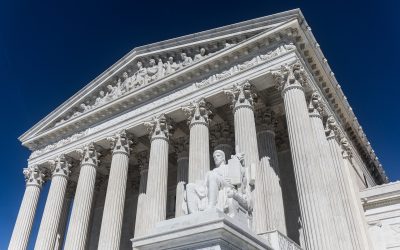The Federal Communications Commission recently asked Congress to hand it broad powers to regulate “excessive violence” on TV, the way it currently restricts “indecent” speech: broadcasters who violate the FCC’s limitations on “excessive violence” will face crippling fines and, potentially, the loss of their broadcast licenses. Isn’t it time to ask: How did a country that reveres free speech end up with a government agency that imposes continually expanding speech restrictions–and where will those restrictions end?
Free speech means the right to express the products of the mind (scientific conclusions, artistic creations, political views, etc.) using whatever words or images one chooses over a medium one can rightfully access, without interference by the government. It means the right of a publisher to publish a controversial novel; the right of a newspaper to run an article criticizing the government–and the right of broadcasters to decide what content will flow over their airwaves.
But in 1927, just as radios were becoming widely used, the government seized control of the airwaves, declared them “public property,” and assumed the power to regulate them in the name of the “public interest”–an undefinable term that can be stretched to mean anything. Thus broadcasters’ right to free speech was cut off at the root, as the government, having irrationally barred broadcasters from owning the airwaves they made valuable through their technological innovation and broadcast content, went on to dictate how those airwaves could be used.
Initially the government pledged that only “obscene” speech–materials that “depict or describe patently offensive ‘hard core’ sexual conduct”–would be barred from the air. But having abandoned the principle of free speech and established itself as the unchecked arbiter of what could be said on the airwaves, the government was later able to ignore its pledge and, in 1978’s FCC v. Pacifica ruling, expand its speech restrictions to include the broader (and even more nebulous) category of “indecent” speech. Thus, broadcasters could be fined for anything from profanity to sexual double-entendres, to vague references to sexual acts. Now, advocates of censorship are appealing to this precedent in order to justify regulating “excessively violent” content as well.
Moreover, Americans had been assured that speech restrictions would apply only to broadcasters operating on the “public airwaves.” But now, in its quest to regulate “excessive violence,” the FCC is insisting that its regulatory mandate be expanded to cover subscriber-based media such as satellite and cable TV.
If we allow this progression to continue, it is only a matter of time before the FCC starts restricting “offensive” philosophic or scientific views (as some religious opponents of evolution would like). And having gutted free speech on radio and television, what is to stop the government from censoring the Internet, books, and newspapers?
What made this trend toward increasing censorship possible–and inevitable? When the FCC assumed the power to subordinate free speech to the “public interest,” it declared, in effect, that individuals are incompetent to judge what speech they and their children should be exposed to, and so their judgment must be usurped by all-wise FCC bureaucrats, who will control the airwaves in their name. Given this disgraceful principle, it did not matter that the FCC’s initial restrictions were supposedly limited to speech pertaining to sex: if the government knows what’s best for us in the realm of sexual speech and can dictate what we watch or listen to, then there is no reason why it should not control what ideas we should be exposed to across the board. To reverse this destructive trend, therefore, we must do more than resist new speech restrictions–we must abolish existing ones and restore our commitment to the principle of free speech.
Does this mean that parents must be forced to let their children view programming they regard as indecent or violent? No. It is a parent’s job, not the government’s, to decide and control what his child watches, just as the parent is responsible for deciding what he himself watches. If a parent determines that a show is not appropriate for his child, he is free to change the channel, turn off the TV, or block his child’s access to it in some other way. His need to monitor what his child views on TV no more justifies censoring broadcasters than his need to vet what his child reads justifies censoring authors.
Americans face a choice: free speech or censorship. There is no middle ground.
(c) 2007 Ayn Rand Institute. All rights reserved.




